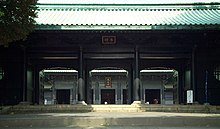Hayashi Razan
| Hayashi Razan | |
|---|---|

Hayashi Razan was head of the early seidō
|
|
| Born | 1583 |
| Died | March 7, 1657 Edo |
| Occupation | Neo-Confucian scholar, academic, administrator, writer |
| Subject | Japanese history, literature |
| Children | Hayashi Gahō, son |
Hayashi Razan (林 羅山?, 1583 – March 7, 1657), also known as Hayashi Dōshun, was a Japanese Neo-Confucian philosopher, serving as a tutor and an advisor to the first four shoguns of the Tokugawa bakufu. He is also attributed with first listing the Three Views of Japan. Razan was the founder of the Hayashi clan of Confucian scholars.
Razan was an influential scholar, teacher and administrator. Together with his sons and grandsons, he is credited with establishing the official neo-Confucian doctrine of the Tokugawa shogunate. Razan's emphasis on the values inherent in a static conservative perspective provided the intellectual underpinnings for the Edo bakufu. Razan also reinterpreted Shinto, and thus created a foundation for the development of Confucianised Shinto which developed in the 20th century.
The intellectual foundation of Razan's life's work was based on early studies with Fujiwara Seika (1561–1619), the first Japanese scholar who is known for a close study of Confucius and the Confucian commentators. This kuge noble had become a Buddhist priest; but Seika's dissatisfaction with the philosophy and doctrines of Buddhism led him to a study of Confucianism. In due course, Seika drew other similarly motivated scholars to join him in studies which were greatly influenced by the work of Chinese Neo-Confucianist Zhu Xi, a Sung-dynasty savant. Zhu Xi and Seika emphasized the role of the individual as a functionary of a society which naturally settles into a certain hierarchical form. He separated people into four distinct classes: samurai (ruling class), farmers, artisans and merchants.
Razan developed a practical blending of Shinto and Confucian beliefs and practices. This coherent construct of inter-related ideas lent themselves to a well-accepted program of samurai and bureaucrat educational, training and testing protocols. In 1607, Hayashi was accepted as a political adviser to the second shogun, Tokugawa Hidetada.
...
Wikipedia
